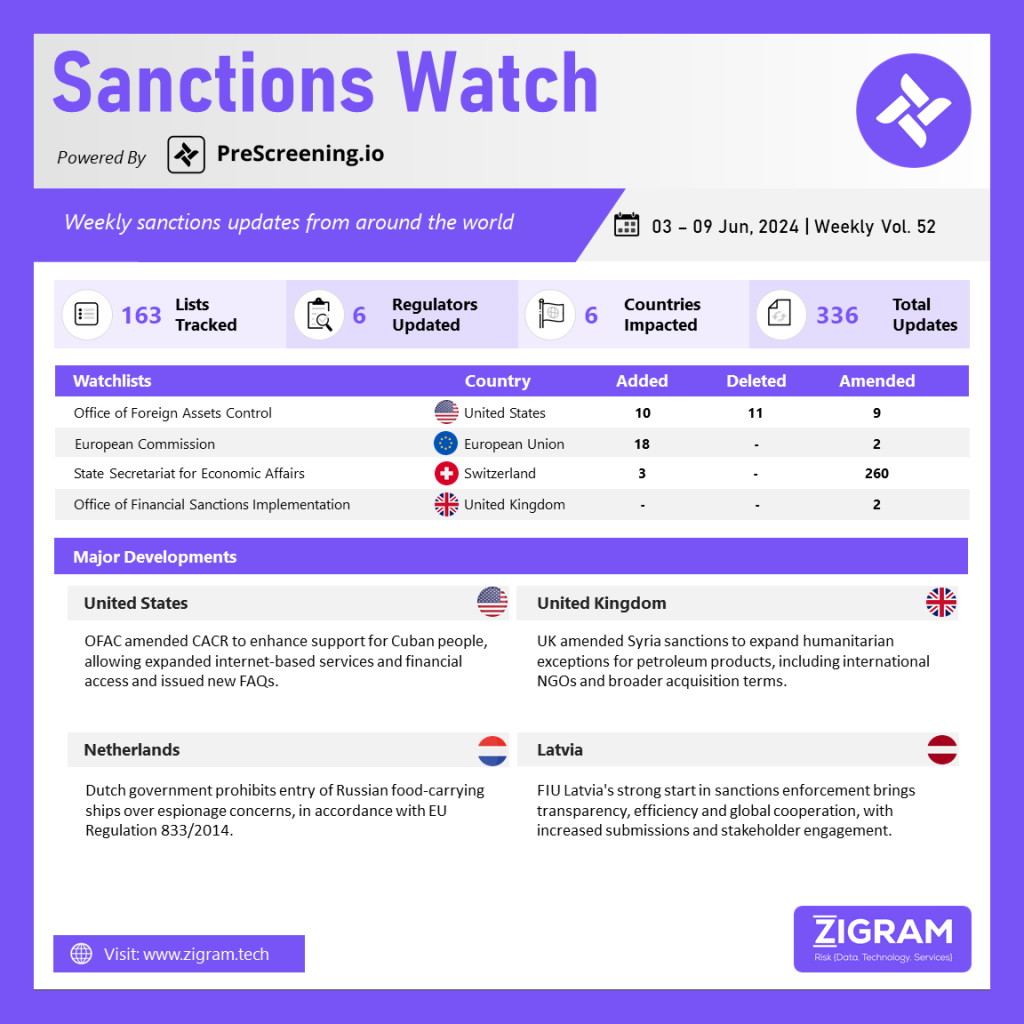In the latest edition of our Sanctions Watch weekly digest, we present significant updates on sanction watchlists and regulatory developments.
On May 28, 2024, the U.S. Department of the Treasury’s Office of Foreign Assets Control (OFAC) revised the Cuban Assets Control Regulations (CACR) to align with the Biden-Harris Administration’s Cuba policy, emphasizing support for the Cuban people. These changes aimed to enhance internet-based services, promote internet freedom, bolster the private sector, and improve access to financial services in Cuba. OFAC issued new FAQs and amended existing ones alongside these revisions. Earlier, on May 16, 2024, the Administration announced initiatives to strengthen Cuba’s private sector, including expanded internet access and support for entrepreneurs. The amendments clarified and broadened authorized internet services, removed export control requirements, and allowed Cuban-origin software exports. OFAC also defined “independent private sector entrepreneur” and reinstated “U-turn” transactions. These changes could benefit Cuban entrepreneurs, facilitate financial transactions, and present opportunities for U.S. businesses. International companies should ensure compliance with the updated regulations and assess the impact on their operations.
The United Kingdom amended the Syria (Sanctions) regulations on Thursday, focusing on petroleum products. This amendment expanded the eligibility criteria for the humanitarian exception, previously limited to UK-funded companies, to include international organizations involved in humanitarian assistance in Syria. It also applies to NGOs funded through bilateral or multilateral means and participating in U.N. humanitarian response plans. Furthermore, the scope of the humanitarian exception was broadened to cover ‘acquisitions’ instead of just the ‘purchase’ of petroleum products. The Syria (Sanctions), fully enforced on December 31, 2020, aim to encourage the Syrian government to stop repressing civilians and to engage in negotiations for a political settlement and peaceful resolution to the conflict in Syria.
The Dutch government has decided to ban Russian food-carrying ships from entering Dutch ports, citing concerns over espionage. This move comes under Article 3ea of EU Regulation 833/2014, which prohibits Russian vessels from accessing any EU territory. However, there is an exception allowing Member States to authorize entry for ships transporting food products. The Dutch Minister of Infrastructure and Water Management notified the Netherlands Parliament of this decision, highlighting the need to prevent potential espionage activities. The decision follows a report by journalists at Pointer, which raised alarms about the use of Russian food-carrying ships for espionage purposes.
The Head of the Latvian Financial Intelligence Unit shared insights into the initial two months since the FIU took over as the national competent authority for sanction implementation. During this period, the FIU processed 95 submissions, reviewed 23 exemption applications, and handled 160 notifications related to sanctions enforcement. The FIU also conducted three training sessions on sanctions compliance, collaborated with ten countries on cross-border cases, and engaged in five international conferences. Looking ahead, the FIU plans to focus strongly on providing proactive support to the private sector. Notably, the FIU is currently involved in its first judicial proceedings, which challenge one of its decisions. These developments underscore the FIU’s commitment to effective sanctions implementation and its proactive approach to regulatory challenges.
- #OFAC
- #CubanAssetsControlRegulations
- #CACR
- #FAQs
- #UnitedKingdom
- #Conflict
- #PeacefulResolution
- #Netherlands
- #RussianVessels
- #EU
- #SanctionsWatch
- #RegulatoryCompliance
- #TradeCompliance
- #SanctionsEnforcement
- #SanctionsMonitoringBoard
- #RegulatoryObligations
- #SanctionsBreaches
- #Latvia
- #FIU

